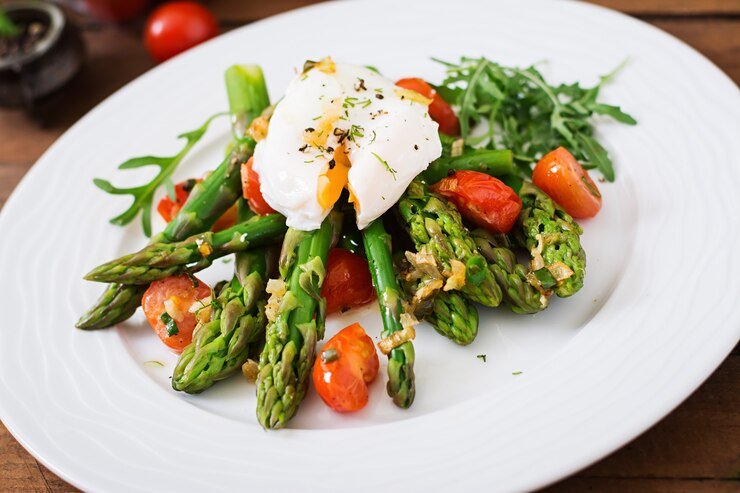Introduction to Asparagus and Eggs
The pairing of asparagus and eggs is a delightful combination that marries the fresh, earthy flavor of asparagus with the rich, creamy texture of eggs. This duo is not only favored for its taste but also for its nutritional benefits, offering a balance of essential vitamins, minerals, and proteins. Asparagus, known for its diuretic properties and high levels of vitamin K, complements eggs, which are a powerhouse of choline and vitamin D. Together, they create a versatile base for many dishes, ranging from simple breakfast options to sophisticated brunches. This combination is celebrated across various cuisines for its simplicity and the elegant contrast between the tender spears of asparagus and the soft, often runny, yolk of the egg, making it a staple in spring menus when asparagus is at its peak.
Culinary Techniques
Preparing Asparagus
Selecting and preparing asparagus properly can enhance its flavor and texture. Choose asparagus with firm, straight stalks and tightly closed tips. The color should be a vibrant green, sometimes with hints of purple. Before cooking, wash the stalks thoroughly to remove any sand or dirt. Trim the woody ends of asparagus by bending the stalk until it snaps naturally. This technique ensures that the fibrous part is removed, leaving the tender sections. For even cooking, you can peel the lower third of the stalk if it seems particularly tough. Asparagus can be cooked in various ways, such as steaming, boiling, grilling, roasting, or sautéing, depending on the desired texture and flavor.
Cooking Eggs
Eggs can be cooked in multiple styles to complement asparagus. For a soft, gentle texture that goes well with the crispness of asparagus, consider poaching or soft boiling eggs. The key to perfect poached eggs is fresh eggs and a splash of vinegar in simmering water to help the whites coagulate. For soft-boiled eggs, timing is crucial; typically, eggs should be boiled for about 5-7 minutes for a runny yolk. Scrambled or fried eggs are great for a quick and hearty addition to any asparagus dish, providing a rich, creamy contrast to the vegetable’s bite.
Asparagus and Soft Boiled Eggs Recipe
Ingredients:
- Fresh Asparagus: 1 pound, ends trimmed
- Large Eggs: 4
- Olive Oil: 2 tablespoons, extra virgin preferred for better flavor
- Salt: to taste, preferably sea salt
- Black Pepper: freshly ground, to taste
- Optional Garnishes:
- Parmesan Cheese: freshly grated
- Lemon Zest: from one lemon
- Fresh Herbs: such as parsley or chives, finely chopped
Equipment Needed:
- Oven (for roasting asparagus)
- Pot (for boiling eggs)
- Baking sheet (if roasting asparagus)
- Skillet (if sautéing asparagus)
- Slotted spoon
- Knife and cutting board
- Bowl for ice water (to cool eggs)
Detailed Instructions:
- Preheat your oven to 400°F (200°C) if you decide to roast the asparagus, which enhances its flavor by caramelizing slightly.
-
Prepare the Asparagus:
- Wash the asparagus under cold water to remove any dirt or grit.
- Use a knife to trim off the tough, woody ends of the stalks – about the last inch or so.
- In a mixing bowl, toss the asparagus with olive oil until evenly coated. Spread them on a baking sheet in a single layer. Sprinkle generously with salt and black pepper.
-
Cook the Asparagus:
- Roasting Option: Place the baking sheet in the preheated oven. Roast the asparagus for about 15-20 minutes, or until the stalks are tender and begin to brown at the tips. Halfway through, you may want to shake the pan or use tongs to turn the stalks for even cooking.
- Sautéing Option: Alternatively, heat a skillet over medium heat. Add the oiled asparagus and season with salt and pepper. Cook, turning occasionally, until the asparagus is tender and lightly charred, about 10-15 minutes.
- Soft Boil the Eggs:
- Fill a pot with enough water to cover the eggs and bring to a boil over high heat.
- Once boiling, reduce to a low boil and use a spoon to gently lower the eggs into the water.
- Cook for exactly 6-7 minutes for soft-boiled eggs with runny yolks or adjust the time depending on your preference.
- Prepare a bowl of ice water. Use a slotted spoon to transfer the eggs from the boiling water to the ice bath to cool them quickly and stop the cooking process.
-
Peeling and Preparing Eggs:
- Once cool, gently crack the eggshells and peel them under running water to help remove the shell cleanly.
- Cut the peeled eggs in half lengthwise.
-
Assemble and Garnish the Dish:
- Arrange the cooked asparagus on plates. Place the halved soft boiled eggs alongside or atop the asparagus.
- Sprinkle the dish with additional salt and pepper to taste.
- Add garnishes like a sprinkle of grated Parmesan, lemon zest, and fresh herbs for extra flavor and a touch of color.
Serving Suggestions:
- Bread: Serve with slices of crusty bread to complement the textures and soak up the creamy egg yolk.
- Salad: Accompany with a light green salad dressed with vinaigrette to balance the richness of the eggs and earthiness of the asparagus.
Tips:
- Choosing Asparagus: For roasting, thicker asparagus spears are better as they remain tender and juicy.
- Egg Freshness: Fresh eggs are easier to peel once cooked, making them ideal for boiling.
Innovative Recipes
Skillet-baked Eggs and Asparagus:
This dish starts by sautéing chopped asparagus in olive oil until slightly tender. Whisk eggs with cream, salt, and pepper, then pour over the asparagus in a skillet. Sprinkle with grated Parmesan and bake at 350°F until the eggs are set but still creamy. This dish combines the simplicity of baked eggs with the fresh, green flavor of asparagus.
Asparagus Frittata:
For this recipe, sauté asparagus pieces with onions until they are just soft. Mix eggs with a little milk, salt, and pepper, and pour over the vegetables in a non-stick pan. Cook on the stove until the edges begin to set, then transfer to the oven to broil until golden and fluffy. This frittata makes a fantastic meal any time of day.
Poached Eggs over Grilled Asparagus:
Grill asparagus with a drizzle of olive oil and a sprinkle of salt until charred and tender. Meanwhile, poach eggs in water with a little vinegar. Serve the grilled asparagus topped with a poached egg, a sprinkle of cracked black pepper, and a touch of lemon zest for a refreshing and elegant dish.
These recipes showcase the versatility of asparagus and eggs, making them suitable for a variety of dining occasions from a casual breakfast to an elegant brunch.
Seasonal and Dietary Considerations
Best Seasons for Asparagus
Asparagus is at its peak flavor and nutritional value during the spring, specifically from April to June. This is when it’s harvested in most regions, leading to fresher and more flavorful spears available in markets. Buying asparagus during these months not only ensures a better taste and texture but also supports local agriculture if sourced from nearby producers. The spears should be firm and the tips should be tightly closed; these are indicators of freshness. Enjoying asparagus in season also means a higher content of vitamins and minerals, as the time from farm to table is significantly reduced.
Dietary Adjustments
Asparagus and eggs are versatile ingredients that fit well into many dietary plans. For vegetarians, this combination provides a high-quality protein source, essential for dietary balance. Keto dieters can enjoy asparagus and eggs as both are low in carbs and high in fiber and fats, respectively, aligning perfectly with the macronutrient requirements of the diet. For those managing diabetes, the low glycemic index of asparagus combined with the protein from eggs helps maintain stable blood sugar levels. Gluten-free and low-calorie diets also benefit from incorporating asparagus and eggs, as they are naturally free from gluten and low in calories, making them ideal for weight management and overall health.
Health Benefits of Baked Eggs with Asparagus
The recipe for Baked Eggs with Asparagus, especially when enhanced with Parmesan cheese, offers several health benefits, making it a nutritious choice for meals:
- Rich in Nutrients: Asparagus is a great source of fiber, folates, vitamins A, C, E, and K, and chromium, a trace mineral that enhances the ability of insulin to transport glucose from the bloodstream into cells.
- Low in Calories and Carbs: This recipe is particularly beneficial for those on a low-carb or ketogenic diet, as asparagus is low in carbohydrates and the dish overall has a low caloric content, which helps in weight management.
- High in Protein: Eggs are a good source of high-quality protein, which is crucial for building and repairing tissues, as well as making enzymes and hormones.
- Heart Health: The monounsaturated and polyunsaturated fats (healthy fats) found in olive oil and the omega-3 fatty acids in eggs contribute to good cardiovascular health by lowering the levels of bad cholesterol.
- Bone Health: The Vitamin K in asparagus plays a critical role in bone health by helping with bone formation and repair. The calcium in Parmesan cheese also contributes to strong bones.
- Antioxidant Properties: Both asparagus and eggs contain antioxidants. Asparagus has glutathione, which helps protect cells from damage, and eggs contain selenium, which is known for its antioxidant properties.
This combination makes the dish not only a tasty and versatile meal option but also a healthy one that supports overall wellness.
FAQs
Common Questions About Asparagus and Eggs
What are the best herbs to pair with asparagus and eggs?
Asparagus and eggs both have mild flavors that benefit from the addition of herbs. The best herbs to enhance this pairing include tarragon, which has a slightly sweet and anise-like flavor, and chives, offering a mild onion taste without overpowering the dish. Parsley brings a fresh, clean taste, while dill pairs wonderfully with eggs in particular, adding a slightly tangy undertone. These herbs not only boost the flavor but also contribute additional nutrients and visual appeal to the dishes.
How long does asparagus take to cook?
The cooking time for asparagus depends on the method used and the thickness of the spears. Generally, thin asparagus spears take about 3-5 minutes to cook when boiled or steamed, whereas thicker spears might take 5-7 minutes. If you’re roasting asparagus in the oven at around 400°F (205°C), it typically takes 10-15 minutes to become tender and lightly browned. Grilling asparagus over medium-high heat also takes approximately 5-10 minutes. It’s best to cook asparagus until it is tender but still slightly crisp, preserving its nutritional value and texture.
Are asparagus and eggs a good breakfast choice for weight loss?
Yes, asparagus and eggs are excellent for a weight-loss diet. Asparagus is low in calories yet rich in fiber, which helps to keep you full and satisfied. Eggs are a great source of protein, aiding in muscle maintenance and metabolic health during weight loss. Together, they provide a balance of nutrients without a high calorie count, making them a smart choice for a filling and nutritious breakfast. Incorporating these foods into your morning routine can help manage hunger and reduce overall calorie intake throughout the day

External Links and Recommended Anchor Text
Here are some external links to recipes that feature asparagus and eggs, which you might find useful:
- Baked Eggs and Asparagus with Parmesan – A delicious recipe by Kalyn’s Kitchen for baked eggs with asparagus, enhanced with Parmesan cheese, perfect for a low-carb breakfast or brunch.
- Easy Asparagus and Eggs | Naturally Ella – This recipe focuses on a simple spring dish combining asparagus and eggs topped with cheese, ideal for an easy breakfast.
- Easy Scrambled Eggs with Asparagus – YouTube – A video recipe that guides you through making easy scrambled eggs with asparagus.
- Asparagus and Eggs – Asparagus-Lover.com – Explore various delicious ways to combine asparagus and eggs, perfect for breakfast or a light snack.
Conclusion
Combining asparagus and eggs in your diet offers a blend of flavor and nutritional benefits ideal for any meal, particularly breakfast or brunch. To fully enjoy these ingredients, consider their peak seasons and opt for fresh, high-quality products. Experiment with different cooking methods like poaching or roasting to discover your preferred textures and flavors. Lastly, don’t shy away from adding herbs or a sprinkle of cheese to enhance the dish. Asparagus and eggs are not only healthy but also incredibly versatile and simple to prepare, making them perfect for both quick meals and elaborate dishes.



1 réflexion au sujet de « Asparagus and Eggs »